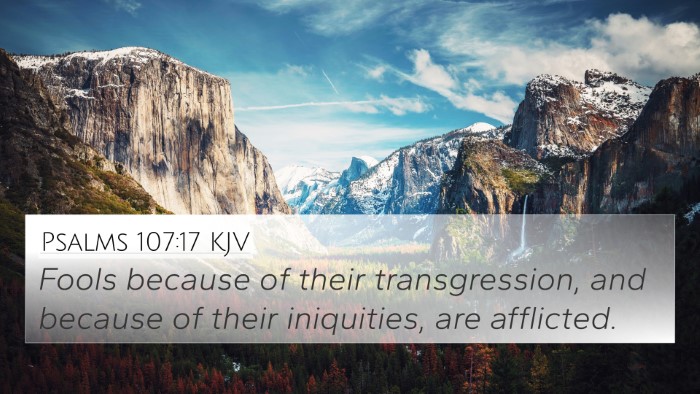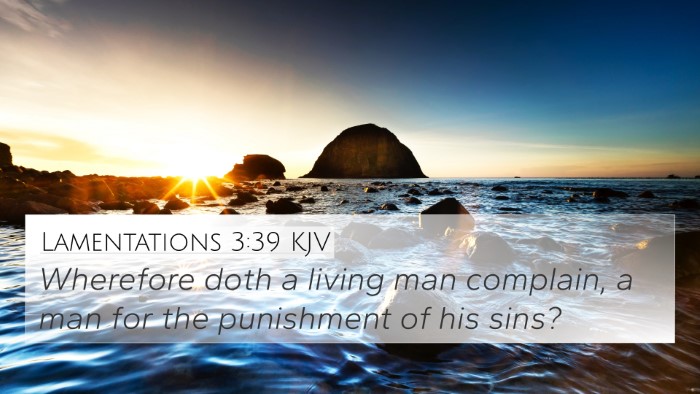Understanding Jeremiah 5:25
Verse: Jeremiah 5:25
Your iniquities have turned these things away, and your sins have withheld good from you.
This verse from the book of Jeremiah highlights the profound consequences of sin on the relationship between God and His people. To understand its implications deeply, we can glean insights from esteemed public domain commentaries, which provide a rich interpretation of the text.
Verse Meaning and Interpretation
Jeremiah 5:25 reflects a critical view of the spiritual and moral state of Israel. It portrays a lament for the good things that have been withheld from the people as a direct result of their iniquities and sins.
-
Matthew Henry's Commentary:
Matthew Henry emphasizes that the verse serves as a stark reminder of God's displeasure with sin. He points out that the “things” being mentioned likely refer to blessings and mercies that God would bestow upon His people. However, their transgressions have created a barrier, preventing them from receiving the goodness intended for them.
-
Albert Barnes' Notes:
Albert Barnes explains that the phrase "your iniquities have turned these things away" indicates that sin is a force that actively repels God’s favor. Barnes stresses that the preceding context of Jeremiah points to a variety of sins, including idolatry and social injustice, leading to a divine withdrawal of blessings.
-
Adam Clarke's Commentary:
Adam Clarke underscores the notion that sin has tangible effects on one's spiritual life. He points out that it is not merely a theoretical idea but a practical reality that the sins of the people have lead to their suffering and desolation, thereby prompting divine absence in their lives.
Cross-References with Other Bible Verses
To further explore the themes presented in Jeremiah 5:25, we can examine related scriptures that echo its sentiments about sin, divine judgment, and the withdrawal of God's blessings:
- Isaiah 59:2: “But your iniquities have separated you from your God; your sins have hidden His face from you.”
- Psalm 66:18: “If I had cherished sin in my heart, the Lord would not have listened.”
- Proverbs 1:28-31: “Then they will call to me but I will not answer; they will look for me but will not find me.”
- Hosea 4:6: “My people are destroyed for lack of knowledge.”
- James 1:17: “Every good gift and every perfect gift is from above, coming down from the Father of lights.”
- Galatians 6:7: “Do not be deceived: God is not mocked, for whatever one sows, that will he also reap.”
- Romans 1:18: “For the wrath of God is revealed from heaven against all ungodliness and unrighteousness of men.”
Thematic Connections
The verse serves as a foundation for thematic connections found throughout the Bible. The influence of sin upon humanity not only appears in the Old Testament but is reiterated in the teachings of the New Testament regarding the necessity of repentance and the pursuit of righteousness.
Tools for Bible Cross-Referencing
Utilizing cross-referencing tools can greatly enhance the understanding of scripture:
- Using a Bible Concordance can help locate related themes and words throughout scripture.
- A Cross-Reference Bible Study method allows for deeper analysis of interconnected verses.
- Digital tools available may provide instant access to Bible cross-reference systems.
- Exploring Bible reference resources and Bible chain references can yield comprehensive insights.
Conclusion
Jeremiah 5:25 challenges the reader to consider the effects of sin on their relationship with God and the resultant withdrawal of His goodness. The insights from respected commentaries and the connections to other scripture demonstrate the biblical principle that sin has serious consequences. Through cross-referencing and thematic analysis, readers can gain a fuller understanding of the intertwined stories and teachings present in the Word of God.
In searching for a deeper understanding of scripture and its meanings, utilizing tools for effective cross-referencing can reveal profound truths and connections across the Bible, enriching one’s faith journey.










